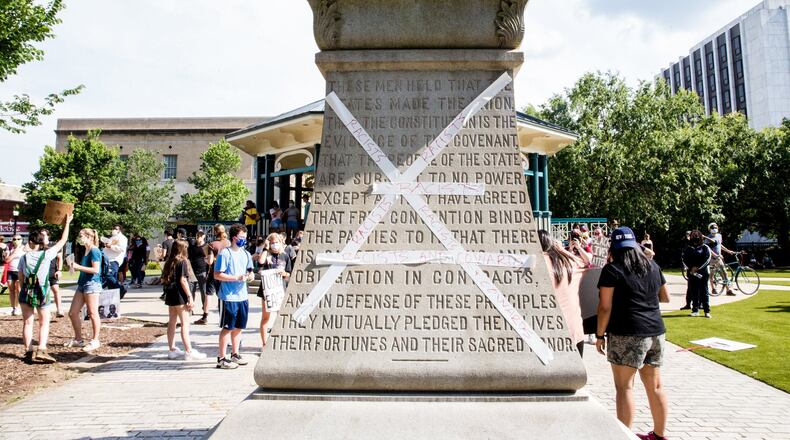In an order issued Friday afternoon, a DeKalb County judge said the Confederate monument in the Decatur square should be immediately relocated.
Judge Clarence Seeliger issued the order in response to a complaint that Decatur's city attorney filed against DeKalb County. The city argued that the 30-foot obelisk had become a threat to public safety during recent protests about racism and police violence toward black people.
Seeliger’s order says the monument should be placed into storage until further notice. It calls for removal to take place by midnight on June 26.
“In short, the Confederate obelisk has become an increasingly frequent target of graffiti and vandalism, a figurative lightning rod for friction among citizens, and a potential catastrophe that could happen at any time if individuals attempt to forcibly remove or destroy it,” Seeliger wrote.
Read the full order at the bottom of this article.
UPDATE: So-called "Lost Cause" monument removed from Decatur Square
Georgia state law makes it extremely difficult for local governments to relocate or remove Confederate monuments, though the updated law adopted last year does include vague language that allows for "appropriate measures for the preservation, protection and interpretation" of monuments.
But Seeliger’s order references a more general section of state law that allows local judges to address public nuisances that are “manifestly injurious to the public health or safety.”
"We were able to work within the existing law to resolve a problem," Decatur City Manager Andrea Arnold told The Atlanta Journal-Constitution. "We didn't have to ask for a law to be changed, the law was right there in front of us."
Gov. Brian Kemp’s office declined to comment on the removal order.
DeKalb County has spent the last several years trying to rid itself of the Lost Cause monument, which was erected by the United Daughters of the Confederacy in 1908. It had no luck.
Last September, the county added a contextualizing marker near the obelisk, which stands near the old county courthouse. The marker says that the monument was erected to "glorify the 'lost cause' of the Confederacy" and has "bolstered white supremacy and faulty history."
Amid ongoing protests over the deaths of George Floyd in Minnesota, Breonna Taylor in Kentucky and Ahmaud Arbery in South Georgia, Confederate monuments across the South have been targeted by vandals, removed by government officials or both. The monuments glorify men who fought to preserve slavery and are emblematic of the country’s history of systemic racism, opponents say.
In Decatur, local groups like Hate Free Decatur and Beacon Hill Black Alliance for Human Rights have been pushing for the monument to be removed since the deadly events of the 2017 “Unite the Right” rally in Charlottesville, Va.
They recently renewed their efforts, asking city and county officials to defy state law and take the monument down.
“We’re calling this a people’s victory,” Fonta High, a board member with Beacon Hill, told the AJC. “This has been a push for a long time.”
“We are pleased to see DeKalb County has heard the will of the people and decided that this monument to white supremacy must go,” Hate Free Decatur’s Sara Patenaude said. “This and other monuments like those erected by the United Daughters of the Confederacy, including the genocide cannon located on the same property, are meant to denigrate and intimidate black people and people of color.”
The cannon she referred to is one used in the Creek War of 1836, a conflict during the removal of Native Americans from the South. It also sits near DeKalb’s historic courthouse.
The city of Decatur recently allocated $50,000 to directly address racism and plan training sessions and community town halls. That move was largely driven by recent controversial incidents within the city that, historically, has a progressive reputation.
But Mayor Patti Garrett also said at the time that the discussion would include “symbols that exist right next to our square.” The Decatur City Commission had pledged “to work with DeKalb and state elected leaders to remove symbols of hate from the city” as well.
"We appreciate DeKalb County’s efforts in recent years to attempt to relocate the monument and we share the County’s frustration that no one was willing to accept the monument,” Garrett said in a statement issued Friday. “We are at a point now where we cannot delay. This symbol of hate and oppression has created a real and present danger to our community and it must be moved for the protection of the public.”
Read the city of Decatur’s full statement at the bottom of this article.
Seeliger, the Superior Court judge who signed Friday's order, has sat on the bench in DeKalb for 40 years. He did not seek re-election and will retire at the end of the year.
He first won election in the early 1980s, replacing the state court judge that sent Martin Luther King Jr. to prison on a probation violation charge that stemmed from a traffic ticket and a sit-in arrest.
Seeliger hired the state court’s first black bailiff and banished a Confederate flag that hung in his courtroom, saying it was “unacceptable in a court of law.”
He also presided over the contentious battle over a “Presidential Parkway” that would’ve run through the neighborhoods of Inman Park, Candler Park and Decatur. Residents vehemently opposed the project, and Seeliger’s ruling stopped it from becoming a reality.
An exact timeline for the monument's planned removal was unclear. But Arnold, the city manager, said Seeliger recommended that the monument be moved well in advance of the deadline set for later this month.
"What happens (next) is the county gets a crane and it's removed," Arnold said.
Keep Reading
The Latest
Featured




